 After departing from Germany, they settled in Australia and began archiving their visual memories, which were eventually sent to Iwalewahaus. Their professional legacy has since been digitized and shared with the Centre of Black Culture and International Understanding (CBCIU) in Osogbo, Nigeria. Their collection has been researched in the frame of collaborative research projects and individual PhD topics, questioning Ulli and Georgina Beiers legacy and its inherent dominant narratives as well as contributing to a broader understanding of Modernisms. Currently, Iwalewahaus as an institution still feeds from its initial strategies, trying to navigate between different stakeholders and ethical commitment.
After departing from Germany, they settled in Australia and began archiving their visual memories, which were eventually sent to Iwalewahaus. Their professional legacy has since been digitized and shared with the Centre of Black Culture and International Understanding (CBCIU) in Osogbo, Nigeria. Their collection has been researched in the frame of collaborative research projects and individual PhD topics, questioning Ulli and Georgina Beiers legacy and its inherent dominant narratives as well as contributing to a broader understanding of Modernisms. Currently, Iwalewahaus as an institution still feeds from its initial strategies, trying to navigate between different stakeholders and ethical commitment.
To read
11.10.2024 | by Katharina Greven
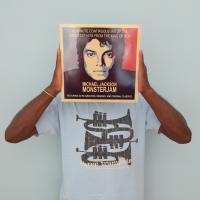 Balanced between various cultures, he has lived for 31 years in a more open and diverse Lisbon, an openness and diversity to which people like Lucky have contributed so much, from building the city to making the city dance.
This is a city of hard times, but also of encounters and possibilities with which he has grown up. In this text, we are led by the memories of Dj Lucky, between various sound tracks of quisange, semba, and afro blues, and multiple tracks on the floor, from Kinshasa to the Graça neighborhood, passing through Luanda, Cova da Moura, and Bairro Alto.
Balanced between various cultures, he has lived for 31 years in a more open and diverse Lisbon, an openness and diversity to which people like Lucky have contributed so much, from building the city to making the city dance.
This is a city of hard times, but also of encounters and possibilities with which he has grown up. In this text, we are led by the memories of Dj Lucky, between various sound tracks of quisange, semba, and afro blues, and multiple tracks on the floor, from Kinshasa to the Graça neighborhood, passing through Luanda, Cova da Moura, and Bairro Alto.
Face to face
15.11.2022 | by Marta Lança
 At its heart, MIXED is an exploration of racial and cultural identity. MIXED deals specifically with people that have mixed heritage, delving into the experiences of each subject that also echo his own. The series addresses the existential feeling of not fully belonging, while examining the cost of assimilation within society. The conversations focus especially on the contradiction of fitting in everywhere but nowhere at the same time and the resulting shoot is a collaboration that encompasses the themes considered.
At its heart, MIXED is an exploration of racial and cultural identity. MIXED deals specifically with people that have mixed heritage, delving into the experiences of each subject that also echo his own. The series addresses the existential feeling of not fully belonging, while examining the cost of assimilation within society. The conversations focus especially on the contradiction of fitting in everywhere but nowhere at the same time and the resulting shoot is a collaboration that encompasses the themes considered.
Stages
02.11.2022 | by Theo Gould
 This series continues the investigations that singularise Chagas’ work, namely the attention to the experiential and affective relationships that subjects establish with everyday objects and spaces, countering fast rhythms of consumption through a decelerated gaze that closely scrutinises discarded materials, shapes and textures. However, the series simultaneously marks a kind of turning point, insofar as, unlike previous series carried out in various urban public spaces to the North and South, vaguely identified (the streets and beaches of Luanda, Venice, London and Newport, etc.), in this series, for the first time, the photographer focused on the indoors and outdoors of a specific architecture.
This series continues the investigations that singularise Chagas’ work, namely the attention to the experiential and affective relationships that subjects establish with everyday objects and spaces, countering fast rhythms of consumption through a decelerated gaze that closely scrutinises discarded materials, shapes and textures. However, the series simultaneously marks a kind of turning point, insofar as, unlike previous series carried out in various urban public spaces to the North and South, vaguely identified (the streets and beaches of Luanda, Venice, London and Newport, etc.), in this series, for the first time, the photographer focused on the indoors and outdoors of a specific architecture.
I'll visit
29.09.2022 | by Ana Balona de Oliveira
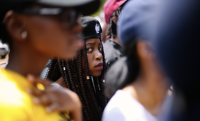 Stuart Hall’s ironic use of “the west and the rest” is very real in the fixation among South Africans with “us” and “Africa”. It was encouraging that a sense of South Africa’s inextricable connectedness to the rest of the continent surfaced at moments in the FMF struggle. But the curiosity about and interest in African politics, literature, and academic knowledge still hasn’t really taken off, whether among students or established scholars.
Stuart Hall’s ironic use of “the west and the rest” is very real in the fixation among South Africans with “us” and “Africa”. It was encouraging that a sense of South Africa’s inextricable connectedness to the rest of the continent surfaced at moments in the FMF struggle. But the curiosity about and interest in African politics, literature, and academic knowledge still hasn’t really taken off, whether among students or established scholars.
Face to face
30.05.2022 | by Sean Jacobs
 I think we always have the responsibility of looking into the ghosts of these colonial dreams and taking the ideas further. For example, we must rethink what are artwork features and what exactly defines them? Institutions change, in a slow and tedious way, but it happens. If we also think about the thesis and how it is configurated, how free can we be about the aesthetic part of it? Now we can offer “decolonize art studies” as a course. All the reconfigurations are a very long process to be achieved. A very important thing I would like to highlight is that where you are you must do your work and contribution. We should try to influence others with our work, inspiring them and trying to change what we know is wrong.
I think we always have the responsibility of looking into the ghosts of these colonial dreams and taking the ideas further. For example, we must rethink what are artwork features and what exactly defines them? Institutions change, in a slow and tedious way, but it happens. If we also think about the thesis and how it is configurated, how free can we be about the aesthetic part of it? Now we can offer “decolonize art studies” as a course. All the reconfigurations are a very long process to be achieved. A very important thing I would like to highlight is that where you are you must do your work and contribution. We should try to influence others with our work, inspiring them and trying to change what we know is wrong.
Face to face
18.03.2022 | by Arimilde Soares
 The past five years have seen a flurry of activity around issues of restitution of African material heritage, resulting in new reports, new books and even, new returns. Along with this sudden surge in activity there has been an escalation in debate around these questions, where positions once thought to be entrenched, racist, conservative, and considered mainstream, seem to have shifted dramatically. In the frenzy, it can begin to feel as if things are changing and that society is progressing. But we’d do well to pause for deeper dives and more systematic remembering of what has come before.
The past five years have seen a flurry of activity around issues of restitution of African material heritage, resulting in new reports, new books and even, new returns. Along with this sudden surge in activity there has been an escalation in debate around these questions, where positions once thought to be entrenched, racist, conservative, and considered mainstream, seem to have shifted dramatically. In the frenzy, it can begin to feel as if things are changing and that society is progressing. But we’d do well to pause for deeper dives and more systematic remembering of what has come before.
To read
28.12.2021 | by
 The exhibition Europa Oxalá is also the ideal time to deconstruct the colonial myth and the post-colonial melancholy designated as “African art”. Attributed to all artistic production that originates in the African continent, the expression has been used to differentiate it in a coarse way from all the art included in the compendiums and narratives of the universal history of art founded in the Western matrix. So-called African art was seen as an art without authorship, disconnected from the diversity of its production contexts, be they a country of North Africa, of the South or the east or west coast, be it the 14th or 20th century.
The exhibition Europa Oxalá is also the ideal time to deconstruct the colonial myth and the post-colonial melancholy designated as “African art”. Attributed to all artistic production that originates in the African continent, the expression has been used to differentiate it in a coarse way from all the art included in the compendiums and narratives of the universal history of art founded in the Western matrix. So-called African art was seen as an art without authorship, disconnected from the diversity of its production contexts, be they a country of North Africa, of the South or the east or west coast, be it the 14th or 20th century.
To read
18.10.2021 | by António Pinto Ribeiro
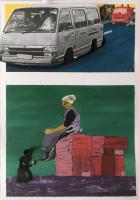 The article by Achille, I think, significantly points out the legitimacy of being limited from obtaining oxygen, by explicitly pointing out that for some parts of the world where healthcare is part of organized neglect, we are faced with more than just the need to physically breathe. There is a prohibition of breathing that is systemic in nature which is part of a larger need for the freedom to breathe (live). For example the violent killings of black civilians by the police in South Africa due to an unchecked implementation of COVID-19 laws and regulations left us questioning the relevance (need) for policing systems embedded in colonial rhetoric.
The article by Achille, I think, significantly points out the legitimacy of being limited from obtaining oxygen, by explicitly pointing out that for some parts of the world where healthcare is part of organized neglect, we are faced with more than just the need to physically breathe. There is a prohibition of breathing that is systemic in nature which is part of a larger need for the freedom to breathe (live). For example the violent killings of black civilians by the police in South Africa due to an unchecked implementation of COVID-19 laws and regulations left us questioning the relevance (need) for policing systems embedded in colonial rhetoric.
Face to face
08.04.2021 | by Marcos Jinguba
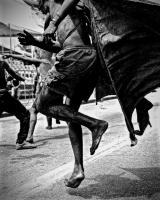 There is a present-day tendency to retreat into the realms of dystopia, of catastrophe and disaster, of failed states and fascism, of environmental collapse and economic apocalypse. This tendency is neither wrong nor mistaken. Yet it is often suffocating, only adding to the pressurized dread of the era, offering no antidote to the plague of cynicism, the chokehold of hopelessness, the drift, or, perhaps, the plunge, into a miasma of pessimism and hopelessness. Of course, there are other tendencies, other possibilities, other ways forward. Here, we briefly mention five recent books, loosely grouped under the banners of anarchism, autonomy, and utopia, that propose better worlds to come – as better must come.
There is a present-day tendency to retreat into the realms of dystopia, of catastrophe and disaster, of failed states and fascism, of environmental collapse and economic apocalypse. This tendency is neither wrong nor mistaken. Yet it is often suffocating, only adding to the pressurized dread of the era, offering no antidote to the plague of cynicism, the chokehold of hopelessness, the drift, or, perhaps, the plunge, into a miasma of pessimism and hopelessness. Of course, there are other tendencies, other possibilities, other ways forward. Here, we briefly mention five recent books, loosely grouped under the banners of anarchism, autonomy, and utopia, that propose better worlds to come – as better must come.
To read
18.03.2021 | by The Public Archive
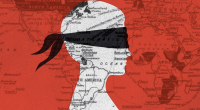 Ignoring the central role of race and colonialism in world affairs precludes an accurate understanding of the modern state system.
Worldwide protests against police racism and brutality and the toppling of statues commemorating white supremacists have led to a public reckoning in the United States and many other countries—forcing citizens and governments to confront the historical legacy of systemic racism and the enduring inequalities it has created.
Ignoring the central role of race and colonialism in world affairs precludes an accurate understanding of the modern state system.
Worldwide protests against police racism and brutality and the toppling of statues commemorating white supremacists have led to a public reckoning in the United States and many other countries—forcing citizens and governments to confront the historical legacy of systemic racism and the enduring inequalities it has created.
Games Without Borders
16.02.2021 | by Gurminder K. Bhambra, Yolande Bouka , Randolph B. Persaud, Olivia U. Rutazibwa, Vineet Thakur, Duncan Bell, Karen Smith, Toni Haastrup and Seifudein Adem
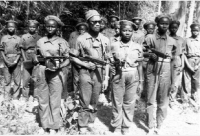 It is February 1964—one year into the armed struggle for independence in Guinea Bissau against Portuguese colonial rule. Cabral, the independence struggle’s leader, had called a conference in Cassaca for his African Party for the Independence of Guinea and Cape Verde (PAIGC) fighters to re-organize and address inter-party grievances.
The Cabral as seen in this and similar photographs, with his defiant stance, dark glasses, and signature knitted stocking cap in spite of the West African heat, would become the iconic image of the West African country. More than fifty years later, the image is still used to signify both Guinea Bissau’s victory in the 11-year independence struggle and the country’s continued hopes for the future. But what about the faces of the young women surrounding the independence hero? Directly to Cabral’s left in the image stands a round-faced, then 14-year old girl, Joana Gomes.
It is February 1964—one year into the armed struggle for independence in Guinea Bissau against Portuguese colonial rule. Cabral, the independence struggle’s leader, had called a conference in Cassaca for his African Party for the Independence of Guinea and Cape Verde (PAIGC) fighters to re-organize and address inter-party grievances.
The Cabral as seen in this and similar photographs, with his defiant stance, dark glasses, and signature knitted stocking cap in spite of the West African heat, would become the iconic image of the West African country. More than fifty years later, the image is still used to signify both Guinea Bissau’s victory in the 11-year independence struggle and the country’s continued hopes for the future. But what about the faces of the young women surrounding the independence hero? Directly to Cabral’s left in the image stands a round-faced, then 14-year old girl, Joana Gomes.
Games Without Borders
04.02.2021 | by Ricci Shryock
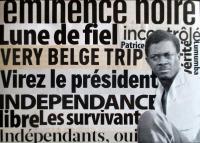 On June 30, 1960, at the ceremony for the proclamation of independence of the Congo, there were three speeches: from King Baudouin of Belgium, the former colonizing power, the President of the Congo, Joseph Kasavubu, and Patrice Lumumba, Prime Minister, the latter in an intervention not foreseen in the initial protocol. It was a short speech of about twelve minutes, written in an accessible and incisive language, performative and visual, a speech that, as the historian Jean Omasombo Tshonda defends, "founds the independent Congo". The first eight minutes are the clearest definition of what colonialism is from the point of view of a continent, a country, a community, a person.
On June 30, 1960, at the ceremony for the proclamation of independence of the Congo, there were three speeches: from King Baudouin of Belgium, the former colonizing power, the President of the Congo, Joseph Kasavubu, and Patrice Lumumba, Prime Minister, the latter in an intervention not foreseen in the initial protocol. It was a short speech of about twelve minutes, written in an accessible and incisive language, performative and visual, a speech that, as the historian Jean Omasombo Tshonda defends, "founds the independent Congo". The first eight minutes are the clearest definition of what colonialism is from the point of view of a continent, a country, a community, a person.
To read
01.02.2021 | by Margarida Calafate Ribeiro
 In the face of this new narrative that acknowledges artistic production and an appreciation of it by African communities, how do secular cultural traditions of African countries interact today with artistic training and production, in the case of Afrodescendant artists, who were born and raised in European countries? How do events in the history of Africa and Africans combine with the artistic languages of the "European schools" and, in particular, with contemporary themes?
In the face of this new narrative that acknowledges artistic production and an appreciation of it by African communities, how do secular cultural traditions of African countries interact today with artistic training and production, in the case of Afrodescendant artists, who were born and raised in European countries? How do events in the history of Africa and Africans combine with the artistic languages of the "European schools" and, in particular, with contemporary themes?
To read
28.12.2020 | by António Pinto Ribeiro
 My own difficult experience teaching literature bears this out. Students’ response to every African story is that “the white man stole our culture, we are ashamed of our identity and need to return to our cultures”. But even as they limit colonialism to an exclusively cultural enterprise, they are not able to connect with stories of the past to which they say we should return to.
My own difficult experience teaching literature bears this out. Students’ response to every African story is that “the white man stole our culture, we are ashamed of our identity and need to return to our cultures”. But even as they limit colonialism to an exclusively cultural enterprise, they are not able to connect with stories of the past to which they say we should return to.
To read
22.12.2020 | by Wandia Njoya
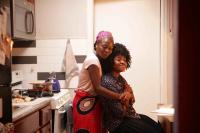 Angolans have made themselves in- and outside Angola, in conversation with the world. In the departures and arrivals, they carry with them the intangible and immaterial: intuition, faith, dance, and the sad and deep look of permanent uncertainty. But they also take with them the smile of resistance that can hide sadness and misfortunes. Perhaps at arrivals and departures there isn’t much to say. Perhaps all that is needed is to listen in silence and with a hug. A hug that knows how to listen.
Angolans have made themselves in- and outside Angola, in conversation with the world. In the departures and arrivals, they carry with them the intangible and immaterial: intuition, faith, dance, and the sad and deep look of permanent uncertainty. But they also take with them the smile of resistance that can hide sadness and misfortunes. Perhaps at arrivals and departures there isn’t much to say. Perhaps all that is needed is to listen in silence and with a hug. A hug that knows how to listen.
Afroscreen
21.12.2020 | by André Castro Soares
 Today, tens of thousands of girls under the age of 18 were married off. Today, one in three women can expect to experience some form of physical or sexual violence in their lifetime. This needs to change, and it needs to change now. Each of these numbers tells a personal story and each one of these women or girls could have been my friend, my sister, my mother, my daughter, or me. That is what motivates me to create a better world for women and girls, no matter where they may be.
Today, tens of thousands of girls under the age of 18 were married off. Today, one in three women can expect to experience some form of physical or sexual violence in their lifetime. This needs to change, and it needs to change now. Each of these numbers tells a personal story and each one of these women or girls could have been my friend, my sister, my mother, my daughter, or me. That is what motivates me to create a better world for women and girls, no matter where they may be.
Face to face
14.12.2020 | by Regina Jane Jere and Natalia Kanem
 “If it hadn’t been for World War II, African countries wouldn’t have been able to liberate themselves from colonial empires”. This observation, made by Mamadou Diouf – a Senegal-born Pole, activist and legend of the Warsaw music scene, during a debate organized in June 2019 as part of the 30th Malta Festival in Poznań seems to be a provocation rather than an objective statement of facts. The average Pole is unable to imagine that this cruel conflict, which began in Poland, could bring anything positive for humanity. In a country so profoundly affected by this war, Diouf’s statement is surprising, almost shocking.
“If it hadn’t been for World War II, African countries wouldn’t have been able to liberate themselves from colonial empires”. This observation, made by Mamadou Diouf – a Senegal-born Pole, activist and legend of the Warsaw music scene, during a debate organized in June 2019 as part of the 30th Malta Festival in Poznań seems to be a provocation rather than an objective statement of facts. The average Pole is unable to imagine that this cruel conflict, which began in Poland, could bring anything positive for humanity. In a country so profoundly affected by this war, Diouf’s statement is surprising, almost shocking.
Afroscreen
20.10.2020 | by Katarzyna Cytlak
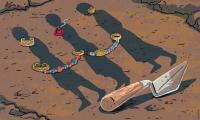 The cumulative individual tragedies on slave trails to the coast, in the barracoons, and on the beaches: no one can even count. So the four centuries of African enslavement by Europeans remains an abstract story. The need to make it real, to find things that you can see, touch and feel is what most motivated me to participate in the ambitious documentary series Enslaved with Samuel L Jackson, to be broadcast on the BBC starting on Sunday. It’s an attempt to get away from the numbers and statistics and instead focus on the real people who endured this era – their flesh and bone, dreams and legacies.
The cumulative individual tragedies on slave trails to the coast, in the barracoons, and on the beaches: no one can even count. So the four centuries of African enslavement by Europeans remains an abstract story. The need to make it real, to find things that you can see, touch and feel is what most motivated me to participate in the ambitious documentary series Enslaved with Samuel L Jackson, to be broadcast on the BBC starting on Sunday. It’s an attempt to get away from the numbers and statistics and instead focus on the real people who endured this era – their flesh and bone, dreams and legacies.
To read
16.10.2020 | by Afua Hirsch
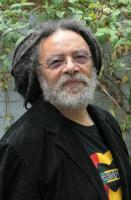 My talk will discuss the altered ecology of belonging that has emerged into Africa’s diasporas during the decades since “Black Atlantic” was published. My discussion of the problems that this has raised will centre on several key themes. They include the fortification of the overdeveloped countries, the impact of new communicative technologies on conceptions of solidarity, relationality and mutuality, the resurgence of extractive capitalism, and the export of generic racial identities from the USA to the whole world.
My talk will discuss the altered ecology of belonging that has emerged into Africa’s diasporas during the decades since “Black Atlantic” was published. My discussion of the problems that this has raised will centre on several key themes. They include the fortification of the overdeveloped countries, the impact of new communicative technologies on conceptions of solidarity, relationality and mutuality, the resurgence of extractive capitalism, and the export of generic racial identities from the USA to the whole world.
I'll visit
08.07.2019 | by vários
 After departing from Germany, they settled in Australia and began archiving their visual memories, which were eventually sent to Iwalewahaus. Their professional legacy has since been digitized and shared with the Centre of Black Culture and International Understanding (CBCIU) in Osogbo, Nigeria. Their collection has been researched in the frame of collaborative research projects and individual PhD topics, questioning Ulli and Georgina Beiers legacy and its inherent dominant narratives as well as contributing to a broader understanding of Modernisms. Currently, Iwalewahaus as an institution still feeds from its initial strategies, trying to navigate between different stakeholders and ethical commitment.
After departing from Germany, they settled in Australia and began archiving their visual memories, which were eventually sent to Iwalewahaus. Their professional legacy has since been digitized and shared with the Centre of Black Culture and International Understanding (CBCIU) in Osogbo, Nigeria. Their collection has been researched in the frame of collaborative research projects and individual PhD topics, questioning Ulli and Georgina Beiers legacy and its inherent dominant narratives as well as contributing to a broader understanding of Modernisms. Currently, Iwalewahaus as an institution still feeds from its initial strategies, trying to navigate between different stakeholders and ethical commitment.  Balanced between various cultures, he has lived for 31 years in a more open and diverse Lisbon, an openness and diversity to which people like Lucky have contributed so much, from building the city to making the city dance.
This is a city of hard times, but also of encounters and possibilities with which he has grown up. In this text, we are led by the memories of Dj Lucky, between various sound tracks of quisange, semba, and afro blues, and multiple tracks on the floor, from Kinshasa to the Graça neighborhood, passing through Luanda, Cova da Moura, and Bairro Alto.
Balanced between various cultures, he has lived for 31 years in a more open and diverse Lisbon, an openness and diversity to which people like Lucky have contributed so much, from building the city to making the city dance.
This is a city of hard times, but also of encounters and possibilities with which he has grown up. In this text, we are led by the memories of Dj Lucky, between various sound tracks of quisange, semba, and afro blues, and multiple tracks on the floor, from Kinshasa to the Graça neighborhood, passing through Luanda, Cova da Moura, and Bairro Alto.  At its heart, MIXED is an exploration of racial and cultural identity. MIXED deals specifically with people that have mixed heritage, delving into the experiences of each subject that also echo his own. The series addresses the existential feeling of not fully belonging, while examining the cost of assimilation within society. The conversations focus especially on the contradiction of fitting in everywhere but nowhere at the same time and the resulting shoot is a collaboration that encompasses the themes considered.
At its heart, MIXED is an exploration of racial and cultural identity. MIXED deals specifically with people that have mixed heritage, delving into the experiences of each subject that also echo his own. The series addresses the existential feeling of not fully belonging, while examining the cost of assimilation within society. The conversations focus especially on the contradiction of fitting in everywhere but nowhere at the same time and the resulting shoot is a collaboration that encompasses the themes considered.  This series continues the investigations that singularise Chagas’ work, namely the attention to the experiential and affective relationships that subjects establish with everyday objects and spaces, countering fast rhythms of consumption through a decelerated gaze that closely scrutinises discarded materials, shapes and textures. However, the series simultaneously marks a kind of turning point, insofar as, unlike previous series carried out in various urban public spaces to the North and South, vaguely identified (the streets and beaches of Luanda, Venice, London and Newport, etc.), in this series, for the first time, the photographer focused on the indoors and outdoors of a specific architecture.
This series continues the investigations that singularise Chagas’ work, namely the attention to the experiential and affective relationships that subjects establish with everyday objects and spaces, countering fast rhythms of consumption through a decelerated gaze that closely scrutinises discarded materials, shapes and textures. However, the series simultaneously marks a kind of turning point, insofar as, unlike previous series carried out in various urban public spaces to the North and South, vaguely identified (the streets and beaches of Luanda, Venice, London and Newport, etc.), in this series, for the first time, the photographer focused on the indoors and outdoors of a specific architecture.  Stuart Hall’s ironic use of “the west and the rest” is very real in the fixation among South Africans with “us” and “Africa”. It was encouraging that a sense of South Africa’s inextricable connectedness to the rest of the continent surfaced at moments in the FMF struggle. But the curiosity about and interest in African politics, literature, and academic knowledge still hasn’t really taken off, whether among students or established scholars.
Stuart Hall’s ironic use of “the west and the rest” is very real in the fixation among South Africans with “us” and “Africa”. It was encouraging that a sense of South Africa’s inextricable connectedness to the rest of the continent surfaced at moments in the FMF struggle. But the curiosity about and interest in African politics, literature, and academic knowledge still hasn’t really taken off, whether among students or established scholars.  I think we always have the responsibility of looking into the ghosts of these colonial dreams and taking the ideas further. For example, we must rethink what are artwork features and what exactly defines them? Institutions change, in a slow and tedious way, but it happens. If we also think about the thesis and how it is configurated, how free can we be about the aesthetic part of it? Now we can offer “decolonize art studies” as a course. All the reconfigurations are a very long process to be achieved. A very important thing I would like to highlight is that where you are you must do your work and contribution. We should try to influence others with our work, inspiring them and trying to change what we know is wrong.
I think we always have the responsibility of looking into the ghosts of these colonial dreams and taking the ideas further. For example, we must rethink what are artwork features and what exactly defines them? Institutions change, in a slow and tedious way, but it happens. If we also think about the thesis and how it is configurated, how free can we be about the aesthetic part of it? Now we can offer “decolonize art studies” as a course. All the reconfigurations are a very long process to be achieved. A very important thing I would like to highlight is that where you are you must do your work and contribution. We should try to influence others with our work, inspiring them and trying to change what we know is wrong.  The past five years have seen a flurry of activity around issues of restitution of African material heritage, resulting in new reports, new books and even, new returns. Along with this sudden surge in activity there has been an escalation in debate around these questions, where positions once thought to be entrenched, racist, conservative, and considered mainstream, seem to have shifted dramatically. In the frenzy, it can begin to feel as if things are changing and that society is progressing. But we’d do well to pause for deeper dives and more systematic remembering of what has come before.
The past five years have seen a flurry of activity around issues of restitution of African material heritage, resulting in new reports, new books and even, new returns. Along with this sudden surge in activity there has been an escalation in debate around these questions, where positions once thought to be entrenched, racist, conservative, and considered mainstream, seem to have shifted dramatically. In the frenzy, it can begin to feel as if things are changing and that society is progressing. But we’d do well to pause for deeper dives and more systematic remembering of what has come before.  The exhibition Europa Oxalá is also the ideal time to deconstruct the colonial myth and the post-colonial melancholy designated as “African art”. Attributed to all artistic production that originates in the African continent, the expression has been used to differentiate it in a coarse way from all the art included in the compendiums and narratives of the universal history of art founded in the Western matrix. So-called African art was seen as an art without authorship, disconnected from the diversity of its production contexts, be they a country of North Africa, of the South or the east or west coast, be it the 14th or 20th century.
The exhibition Europa Oxalá is also the ideal time to deconstruct the colonial myth and the post-colonial melancholy designated as “African art”. Attributed to all artistic production that originates in the African continent, the expression has been used to differentiate it in a coarse way from all the art included in the compendiums and narratives of the universal history of art founded in the Western matrix. So-called African art was seen as an art without authorship, disconnected from the diversity of its production contexts, be they a country of North Africa, of the South or the east or west coast, be it the 14th or 20th century.  The article by Achille, I think, significantly points out the legitimacy of being limited from obtaining oxygen, by explicitly pointing out that for some parts of the world where healthcare is part of organized neglect, we are faced with more than just the need to physically breathe. There is a prohibition of breathing that is systemic in nature which is part of a larger need for the freedom to breathe (live). For example the violent killings of black civilians by the police in South Africa due to an unchecked implementation of COVID-19 laws and regulations left us questioning the relevance (need) for policing systems embedded in colonial rhetoric.
The article by Achille, I think, significantly points out the legitimacy of being limited from obtaining oxygen, by explicitly pointing out that for some parts of the world where healthcare is part of organized neglect, we are faced with more than just the need to physically breathe. There is a prohibition of breathing that is systemic in nature which is part of a larger need for the freedom to breathe (live). For example the violent killings of black civilians by the police in South Africa due to an unchecked implementation of COVID-19 laws and regulations left us questioning the relevance (need) for policing systems embedded in colonial rhetoric.  There is a present-day tendency to retreat into the realms of dystopia, of catastrophe and disaster, of failed states and fascism, of environmental collapse and economic apocalypse. This tendency is neither wrong nor mistaken. Yet it is often suffocating, only adding to the pressurized dread of the era, offering no antidote to the plague of cynicism, the chokehold of hopelessness, the drift, or, perhaps, the plunge, into a miasma of pessimism and hopelessness. Of course, there are other tendencies, other possibilities, other ways forward. Here, we briefly mention five recent books, loosely grouped under the banners of anarchism, autonomy, and utopia, that propose better worlds to come – as better must come.
There is a present-day tendency to retreat into the realms of dystopia, of catastrophe and disaster, of failed states and fascism, of environmental collapse and economic apocalypse. This tendency is neither wrong nor mistaken. Yet it is often suffocating, only adding to the pressurized dread of the era, offering no antidote to the plague of cynicism, the chokehold of hopelessness, the drift, or, perhaps, the plunge, into a miasma of pessimism and hopelessness. Of course, there are other tendencies, other possibilities, other ways forward. Here, we briefly mention five recent books, loosely grouped under the banners of anarchism, autonomy, and utopia, that propose better worlds to come – as better must come.  Ignoring the central role of race and colonialism in world affairs precludes an accurate understanding of the modern state system.
Worldwide protests against police racism and brutality and the toppling of statues commemorating white supremacists have led to a public reckoning in the United States and many other countries—forcing citizens and governments to confront the historical legacy of systemic racism and the enduring inequalities it has created.
Ignoring the central role of race and colonialism in world affairs precludes an accurate understanding of the modern state system.
Worldwide protests against police racism and brutality and the toppling of statues commemorating white supremacists have led to a public reckoning in the United States and many other countries—forcing citizens and governments to confront the historical legacy of systemic racism and the enduring inequalities it has created.  It is February 1964—one year into the armed struggle for independence in Guinea Bissau against Portuguese colonial rule. Cabral, the independence struggle’s leader, had called a conference in Cassaca for his African Party for the Independence of Guinea and Cape Verde (PAIGC) fighters to re-organize and address inter-party grievances.
The Cabral as seen in this and similar photographs, with his defiant stance, dark glasses, and signature knitted stocking cap in spite of the West African heat, would become the iconic image of the West African country. More than fifty years later, the image is still used to signify both Guinea Bissau’s victory in the 11-year independence struggle and the country’s continued hopes for the future. But what about the faces of the young women surrounding the independence hero? Directly to Cabral’s left in the image stands a round-faced, then 14-year old girl, Joana Gomes.
It is February 1964—one year into the armed struggle for independence in Guinea Bissau against Portuguese colonial rule. Cabral, the independence struggle’s leader, had called a conference in Cassaca for his African Party for the Independence of Guinea and Cape Verde (PAIGC) fighters to re-organize and address inter-party grievances.
The Cabral as seen in this and similar photographs, with his defiant stance, dark glasses, and signature knitted stocking cap in spite of the West African heat, would become the iconic image of the West African country. More than fifty years later, the image is still used to signify both Guinea Bissau’s victory in the 11-year independence struggle and the country’s continued hopes for the future. But what about the faces of the young women surrounding the independence hero? Directly to Cabral’s left in the image stands a round-faced, then 14-year old girl, Joana Gomes.  On June 30, 1960, at the ceremony for the proclamation of independence of the Congo, there were three speeches: from King Baudouin of Belgium, the former colonizing power, the President of the Congo, Joseph Kasavubu, and Patrice Lumumba, Prime Minister, the latter in an intervention not foreseen in the initial protocol. It was a short speech of about twelve minutes, written in an accessible and incisive language, performative and visual, a speech that, as the historian Jean Omasombo Tshonda defends, "founds the independent Congo". The first eight minutes are the clearest definition of what colonialism is from the point of view of a continent, a country, a community, a person.
On June 30, 1960, at the ceremony for the proclamation of independence of the Congo, there were three speeches: from King Baudouin of Belgium, the former colonizing power, the President of the Congo, Joseph Kasavubu, and Patrice Lumumba, Prime Minister, the latter in an intervention not foreseen in the initial protocol. It was a short speech of about twelve minutes, written in an accessible and incisive language, performative and visual, a speech that, as the historian Jean Omasombo Tshonda defends, "founds the independent Congo". The first eight minutes are the clearest definition of what colonialism is from the point of view of a continent, a country, a community, a person.  In the face of this new narrative that acknowledges artistic production and an appreciation of it by African communities, how do secular cultural traditions of African countries interact today with artistic training and production, in the case of Afrodescendant artists, who were born and raised in European countries? How do events in the history of Africa and Africans combine with the artistic languages of the "European schools" and, in particular, with contemporary themes?
In the face of this new narrative that acknowledges artistic production and an appreciation of it by African communities, how do secular cultural traditions of African countries interact today with artistic training and production, in the case of Afrodescendant artists, who were born and raised in European countries? How do events in the history of Africa and Africans combine with the artistic languages of the "European schools" and, in particular, with contemporary themes?  My own difficult experience teaching literature bears this out. Students’ response to every African story is that “the white man stole our culture, we are ashamed of our identity and need to return to our cultures”. But even as they limit colonialism to an exclusively cultural enterprise, they are not able to connect with stories of the past to which they say we should return to.
My own difficult experience teaching literature bears this out. Students’ response to every African story is that “the white man stole our culture, we are ashamed of our identity and need to return to our cultures”. But even as they limit colonialism to an exclusively cultural enterprise, they are not able to connect with stories of the past to which they say we should return to.  Angolans have made themselves in- and outside Angola, in conversation with the world. In the departures and arrivals, they carry with them the intangible and immaterial: intuition, faith, dance, and the sad and deep look of permanent uncertainty. But they also take with them the smile of resistance that can hide sadness and misfortunes. Perhaps at arrivals and departures there isn’t much to say. Perhaps all that is needed is to listen in silence and with a hug. A hug that knows how to listen.
Angolans have made themselves in- and outside Angola, in conversation with the world. In the departures and arrivals, they carry with them the intangible and immaterial: intuition, faith, dance, and the sad and deep look of permanent uncertainty. But they also take with them the smile of resistance that can hide sadness and misfortunes. Perhaps at arrivals and departures there isn’t much to say. Perhaps all that is needed is to listen in silence and with a hug. A hug that knows how to listen.  Today, tens of thousands of girls under the age of 18 were married off. Today, one in three women can expect to experience some form of physical or sexual violence in their lifetime. This needs to change, and it needs to change now. Each of these numbers tells a personal story and each one of these women or girls could have been my friend, my sister, my mother, my daughter, or me. That is what motivates me to create a better world for women and girls, no matter where they may be.
Today, tens of thousands of girls under the age of 18 were married off. Today, one in three women can expect to experience some form of physical or sexual violence in their lifetime. This needs to change, and it needs to change now. Each of these numbers tells a personal story and each one of these women or girls could have been my friend, my sister, my mother, my daughter, or me. That is what motivates me to create a better world for women and girls, no matter where they may be.  “If it hadn’t been for World War II, African countries wouldn’t have been able to liberate themselves from colonial empires”. This observation, made by Mamadou Diouf – a Senegal-born Pole, activist and legend of the Warsaw music scene, during a debate organized in June 2019 as part of the 30th Malta Festival in Poznań seems to be a provocation rather than an objective statement of facts. The average Pole is unable to imagine that this cruel conflict, which began in Poland, could bring anything positive for humanity. In a country so profoundly affected by this war, Diouf’s statement is surprising, almost shocking.
“If it hadn’t been for World War II, African countries wouldn’t have been able to liberate themselves from colonial empires”. This observation, made by Mamadou Diouf – a Senegal-born Pole, activist and legend of the Warsaw music scene, during a debate organized in June 2019 as part of the 30th Malta Festival in Poznań seems to be a provocation rather than an objective statement of facts. The average Pole is unable to imagine that this cruel conflict, which began in Poland, could bring anything positive for humanity. In a country so profoundly affected by this war, Diouf’s statement is surprising, almost shocking.  The cumulative individual tragedies on slave trails to the coast, in the barracoons, and on the beaches: no one can even count. So the four centuries of African enslavement by Europeans remains an abstract story. The need to make it real, to find things that you can see, touch and feel is what most motivated me to participate in the ambitious documentary series Enslaved with Samuel L Jackson, to be broadcast on the BBC starting on Sunday. It’s an attempt to get away from the numbers and statistics and instead focus on the real people who endured this era – their flesh and bone, dreams and legacies.
The cumulative individual tragedies on slave trails to the coast, in the barracoons, and on the beaches: no one can even count. So the four centuries of African enslavement by Europeans remains an abstract story. The need to make it real, to find things that you can see, touch and feel is what most motivated me to participate in the ambitious documentary series Enslaved with Samuel L Jackson, to be broadcast on the BBC starting on Sunday. It’s an attempt to get away from the numbers and statistics and instead focus on the real people who endured this era – their flesh and bone, dreams and legacies.  My talk will discuss the altered ecology of belonging that has emerged into Africa’s diasporas during the decades since “Black Atlantic” was published. My discussion of the problems that this has raised will centre on several key themes. They include the fortification of the overdeveloped countries, the impact of new communicative technologies on conceptions of solidarity, relationality and mutuality, the resurgence of extractive capitalism, and the export of generic racial identities from the USA to the whole world.
My talk will discuss the altered ecology of belonging that has emerged into Africa’s diasporas during the decades since “Black Atlantic” was published. My discussion of the problems that this has raised will centre on several key themes. They include the fortification of the overdeveloped countries, the impact of new communicative technologies on conceptions of solidarity, relationality and mutuality, the resurgence of extractive capitalism, and the export of generic racial identities from the USA to the whole world. 
